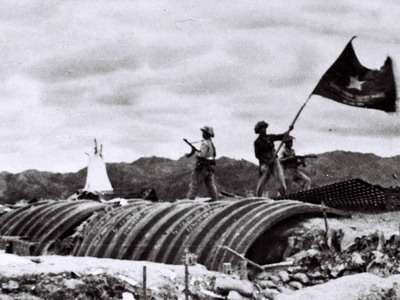Dien Bien Phu campaign: stunning victory for Vietnamese people
VGP – The Dien Bien Phu Victory marks a glorious milestone in the Vietnam’s history in the struggle against colonialism and for independence and freedom in the 20th century.
 |
|
Victory at Dien Bien Phu campaign |
With the victory at Dien Bien Phu and other battlefields throughout the winter and spring of 1953-54, Vietnamese army and people inflicted heavy losses on the French Expeditionary Corps.
This contributed to the success of the Geneva Conference, which recognized Vietnam as an independent and unified nation and completely liberated North Vietnam and the capital city of Hanoi.
North Vietnam became stronger and stronger, to serve as the foundation of the whole country's revolution and as the rearguard for the great frontline in the south.
The victory was the most decisive factor, while the revolutionary movement in the south brought about the successful liberation of the south and the reunification of the country.
Therefore, the victory at Dien Bien Phu and the resistance war against the French gave Vietnamese army and people the basis, theory, experience and confidence to defeat the American aggressors and bring the 30-year-long liberation war to a victorious end.
In the international sphere, the Dien Bien Phu victory signaled the collapse of colonialism and ushered in a new era for oppressed peoples around the world.
Hundreds of peoples lived a life of slavery under the colonialist and imperialist yoke with no way out.
The Dien Bien Phu victory was the first time in the history of the anti-colonialist movement that a nation, small in size and in population and subject to colonial and semi-feudal rule, could rise up and defeat the modern, aggressive army of a Western capitalist power.
The victory was a turning point for our people and of the anti-colonialist movement in the 20th century, as it destroyed and captured a great number of officers and men from a powerful expeditionary corps.
Vietnamese people drew many lessons from the Dien Bien Phu campaign.
The first lesson is to look at the reality of a situation. The practicalities of a situation are constantly changing.
During the winter and spring of 1953-54, we followed the situation closely, were aware of the enemy's intentions and analyzed the contradictions in the French war of aggression and the Navarre plan.
In this way, Uncle Ho and the Politburo could put forward an exact, creative and sharp plan of operations, compelling the enemy to disperse its forces and luring them to Dien Bien Phu where we could wipe them out.
At Dien Bien Phu, the campaign's Party Organization and Command closely followed the developments on the battlefield day and night, and thoroughly analyzed the strengths and weaknesses of either side.
When we detected a swing in the pendulum of power, we would change our tactics and methods to meet the situation. We went from a plan of "fighting fast and winning fast" in three days and two nights to "fighting surely and advancing surely" over a period of 55 days and nights achieve our final victory.
The second lesson was to rely on the strength of the whole country. The enemy claimed its fortifications at Dien Bien Phu were impenetrable, but in reality they were a great obstacle for our soldiers and civilians.
To create the momentum needed to defeat the French at Dien Bien Phu, under the clear-sighted leadership of Uncle Ho and the Party, we successfully mobilized the strength of soldiers and civilians across the country, from north to south, from the liberated areas to occupied zones.
We also gained the sympathy and support of our Lao and Cambodian neighbors, as well as China, the Soviet Union, other socialist countries and progressive people all over the world, including the French people./.
